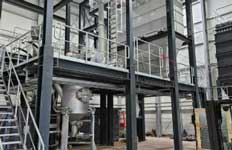Tyre recycler Pyrum Innovations says it has successfully completed the mechanical assembly of a new grinding plant at the site in Dillingen. With an input material of 1,650 kg/hour and an output material of 1,350 kg/hour, the jet mill developed by Japanese machinery maker Hosokawa is said to be the world’s largest grinding plant for recycled carbon black (rCB).
The difference between the input and output material is fed back to the beginning after each cycle and added to the process again, thus avoiding a loss of rCB. The expansion of the grinding capacity is expected to significantly increase the sales of rCB in the future.
After the company commissioned the two new reactors (TAD 2 & 3) last year as part of the site expansion, the installation of a new grinding and pelletising plant became necessary to be able to process the carbon black produced in the new reactors.
After the completion of the mechanical installation, work has already started on the cabling that will supply the plant with power in the future. The grinding plant is scheduled to start operations in April 2025.
Pascal Klein, CEO of Pyrum Innovations, said, “With the successful completion of the assembly of the world’s largest grinding plant for rCB here in Dillingen, we can significantly expand our production capacities. The expansion will enable us to substantially increase sales of our rCB and thus take a further step towards a sustainable and future-oriented circular economy.”
Due to the technical interdependency between the grinding and pelleting plants, production is scheduled to start in the third quarter of 2025.
Since 2008, the company has been developing an innovative thermolysis technology that enables end-of-life tyres and plastics to be recycled with virtually no emissions, it says.
The process can recover high-quality products such as thermolysis oil and rCB, which are used by partners such as BASF, Continental and Schwalbe to manufacture new products. In this way, the company closes the material cycle and pursues a sustainable business model in line with climate targets.
Since 2020, the first plant at the company’s headquarters in Dillingen/Saar has been in continuous operation, and two further plants have been added as part of the site expansion in 2024.

